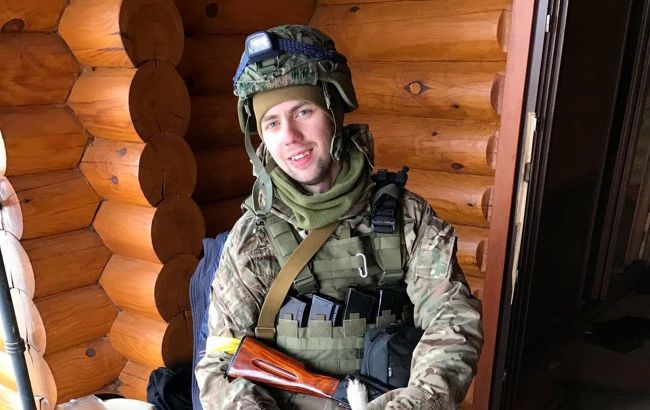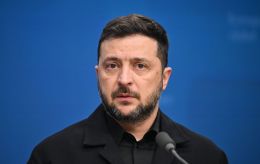Roman Krutiak: 'I was lucky to survive war, and one can get used to sight loss'
 Roman Krutiak before his injury and loss of sight (all photos provided by the interviewee)
Roman Krutiak before his injury and loss of sight (all photos provided by the interviewee)
Roman Krutiak, call sign Khmara ("Cloud"), is a veteran of the 3rd Assault Brigade of the Armed Forces of Ukraine. He lost his eyesight due to injuries at the front. In an interview with RBC-Ukraine, he spoke about the battles in Kyiv and Zaporizhzhia, the story of his injury and rehabilitation.
Every day Ukrainian defenders receive injuries of varying severity at the front. For security reasons, the total number of injuries is not available. However, experts estimate that tens of thousands of soldiers need rehabilitation.
Some defenders have lost their eyesight due to injuries. Some of them are undergoing rehabilitation in Ukraine or abroad. Ukrainians are urged to remember that these soldiers are not victims, but heroes who have preserved their dignity, strength of spirit, and desire to live a full life. And their example inspires us to be stronger.
RBC-Ukraine spoke to a soldier who lost his eyesight due to an injury and is undergoing rehabilitation in the Netherlands.
About the first battles and defense of the Kyiv region
Until 2022, Roman lived in Kyiv and worked as a civilian. He had previously graduated from the military department at the university and had a primary rank of officer. He decided to go to defend Ukraine on the same day as the full-scale Russian offensive began.
"I have long been impressed by the Azov unit, their motivation, and the good attitude of their commanders towards the soldiers. I have been following their work since 2014. I joined the guys in the morning of February 24. On the day of the invasion, I already had a military uniform and a camping backpack from the military department. I just took everything with me and went to the recruiting center where veterans of Azov and other units were gathering," he says.
Roman recalls the first battles he took part in. On February 25-26, the guys were already on their first mission in the Kyiv region. In a small sector, they were conducting surveillance and, if necessary, had to reinforce the brigades in the trenches ahead.
_1.jpg) Roman Krutiak defended the Kyiv region from the first days of the Russian invasion
Roman Krutiak defended the Kyiv region from the first days of the Russian invasion
"At that time, most of us did not have adequate equipment. I had only a Kalashnikov rifle, four Soviet-style ammo magazines, a pouch, and grenades. Later, the equipment became better, but in the early days, we had to make do with what we had. Around that time, I realized the true value of life. When a strike comes within ten meters and you realize that you can die at any moment, your priorities change quickly," the defender adds.
In early March, the Russians failed to break through to Kyiv through Irpin, and the enemy moved their forces to the village of Moshchun. From there, a short road led to Pushcha-Vodytsia and then to Kyiv.
"The enemy's task was to get through this village and reach the capital. On March 7, when our special forces worked on the first group of Russians, in the morning, accompanied by a tank, we went to Moshchun in small groups to clean up. There were a lot of dead. It was striking that these were professional soldiers. Later it turned out that there used to be a large concentration of paratroopers and airborne soldiers in this village. All their elite," Roman says.
Having reached the middle of the village, the military entrenched themselves in a linear defense. In 3-4 days, they repelled several enemy assaults in Moshchun, and suffered their first losses and first wounds. The unit was put into reserve.
The command decided to destroy the pontoon crossings. In late March, the Russians began to retreat from Kyiv. People were horrified to see the crimes committed by the Russians in the region and what the "Russian peace" looked like.
_6.jpg) In the village of Moshchun near Kyiv, Roman, along with other soldiers, carried out a "clean-up" after the occupiers entered the village
In the village of Moshchun near Kyiv, Roman, along with other soldiers, carried out a "clean-up" after the occupiers entered the village
"I thought this was the end." Injuries and loss of vision
After the liberation of the Kyiv region from the invaders, Roman was sent to the Zaporizhzhia direction along with other defenders. At that time, the unit where he served was reformatted into the Azov Kyiv Special Forces. After the Zaporizhzhia campaign, he was transferred to the 3rd separate assault brigade. It gathered fighters from Azov cells across Ukraine: fighters from the Territorial Defense Forces, Special Operations Forces, and others.
At this stage, the military already received modern weapons. They were fully supported by grenade launchers and anti-tank missile systems.
On May 6, there was heavy fighting in the village of Malynivka. Afterward, Roman and the other guys were sent there for a clean-up mission: they went there in four vehicles.
"Unfortunately, an enemy drone spotted us and began to "cover" the artillery. Several of my comrades were wounded. I heard their screams and wanted to run to their aid. When I got up from the ground, one of the shells exploded right next to my head. I received a strong blow to the head, my eyes were flooded with blood. At that moment I could not see anything. I thought it was the end. But later I realized that I was alive and breathing. Although I could no longer see," the man recalls.
His eyes suffered the most damage from the injury: his left eye and nose were damaged, and the bone near his second eye was literally shattered. Roman was rescued and taken to a hospital in Dnipro. There he underwent his first surgery. A week later, he was evacuated from Dnipro to Kyiv by helicopter, where he underwent further surgeries. Back then, he still had hope that his vision could be restored.
 In the Zaporizhzhia direction, a defender was seriously wounded in the eye area
In the Zaporizhzhia direction, a defender was seriously wounded in the eye area
"While I was being treated in Dnipro, my comrades came to visit me, and I told them: "Guys, I'll stay here for another week or two and come back to you, don't run far." Unfortunately, I will not return to the front, but I want to be useful in other ways," says Khmara.
Roman underwent another surgery in the ENT department of a Kyiv hospital. His nose was "repaired": a titanium plate was inserted instead of the bone on the right side. During the next surgery, a shard was removed from his right eye.
"Rehabilitation is like a quest. You go further and further, and you can do more each time"
After surgeries and repeated examinations, unfortunately, the doctors' verdict was unequivocal: the defender's vision could not be restored. Now he is undergoing rehabilitation in the Netherlands, at the center of a medical institute for the blind. There, he is taught to walk with a cane and generally learns to return to life in new conditions. He is also taught how to use the phone properly: it has an audio mode that voices all the actions the user takes when pressing the buttons.
During his rehabilitation, the guy keeps in touch with his comrades, especially those he has known since February 24. "Unfortunately, several of them have already been killed, many wounded. I will never forget them," he admits.
Now the guy can actually use his phone to the fullest. He can log in to Telegram, WhatsApp, or Signal, type text messages, record audio, and make calls. He listens to audiobooks on YouTube. He can do a lot of things on his own in everyday life: brush his teeth, take a bath, make tea and coffee, and take a taxi.

Roman at a meeting with the Ukrainian community in the Netherlands
"It's interesting to learn how to navigate in space. We have five buildings here where trainings are held. I already know where I need to go in each building. I walk independently from my room to the cafeteria, from the cafeteria to the toilet, and then to the next building. I know where the waiting room is, and where to find the right office. So it's all quite interesting. Such rehabilitation is a kind of quest, a challenge: you go further and further and you can do more each time," he says.
He admits that the further you practice, the easier it becomes. You realize that, basically, it's not particularly difficult. It was difficult only at the beginning.
"My girlfriend cooks for me. She has been with me all the way: on May 6, I was wounded, and on May 9, she was with me in the hospital. She always supports me, and I am immensely grateful to her," Roman says.
"When I went to war, I realized all the risks"
The psychological component is important in rehabilitation, Roman assures. Especially in a situation like his - complete loss of vision. But he says with confidence that even in such difficult circumstances, he does not despair.

The soldier is supported in everything by his girlfriend
"In such situations, it's important to accept in advance that something like this can happen. Morally, it is important to work through this before the traumatic event happens. When I went to the war, I understood all the risks and realized what could happen to me. On the morning of February 24, I "buried" myself, so to speak, and was ready for any scenario. So now I realize that losing my eyesight is not the worst thing that can happen to a soldier in war. The main thing is that I survived," the defender says.
Even after such a severe injury, Roman's morale did not break, he assures.
"I realize that I was lucky to survive the war, and one can get used to sight loss. And one can live as close to a full life as possible. So this is definitely not the worst-case scenario. I don't have any psychological problems. I'm my own psychologist and my own motivator," says the defender.
 Roman Krutiak: "One can get used to sight loss and live as close to a full life as possible"
Roman Krutiak: "One can get used to sight loss and live as close to a full life as possible"
You can support the defender by transferring funds for his rehabilitation: this will help him return to his normal life as soon as possible.
Link to the bank card:
https://send.monobank.ua/jar/3ZYzi7ZxeP
Monobank card:
5375411403835072
Privatbank card:
4149499801004381

